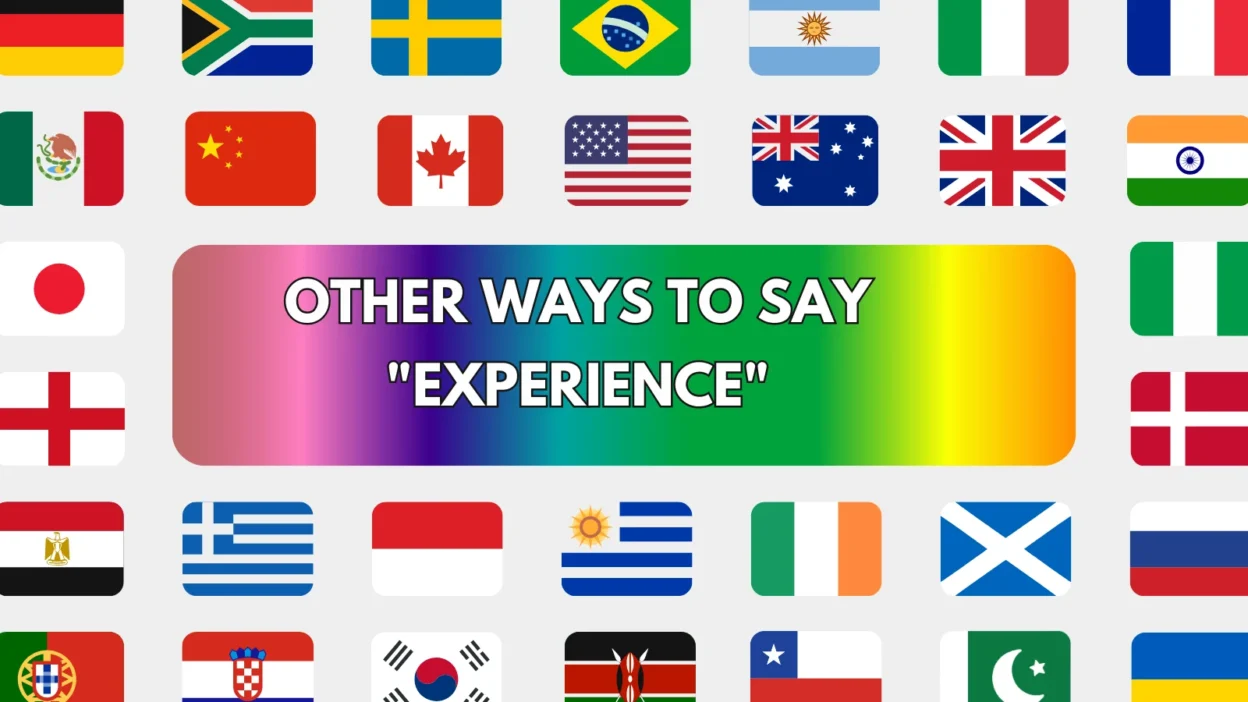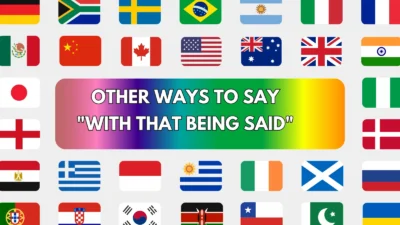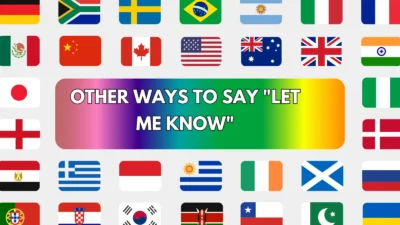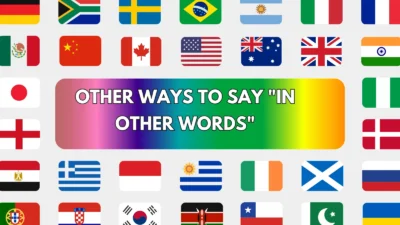The word “experience” is incredibly versatile. We use it to describe knowledge gained, time spent doing something, emotions felt, or exposure to events. But in writing — especially in resumes, essays, or business communication — repeating “experience” over and over can weaken your message.
Whether you’re describing job history, customer interactions, or personal growth, having a variety of alternatives helps keep your tone fresh and precise.
Here are 25 strong alternatives to the word “experience”, each with a clear explanation, use case, and tone to help you sound more polished and professional.
1. Background
Meaning:
Refers to someone’s professional history or educational foundation.
Detailed Explanation:
Use this term when you want to emphasize qualifications, training, or where someone is coming from professionally.
Scenario Example:
She has a strong background in digital marketing and project coordination.
Best Use:
Resumes, bios, formal introductions.
Tone:
Professional, formal, informative.
2. Exposure
Meaning:
Involvement or familiarity with a situation or environment.
Detailed Explanation:
Highlights your awareness or contact with specific fields, even if you weren’t deeply involved.
Scenario Example:
I’ve had exposure to customer service during my internship.
Best Use:
Cover letters, job applications, learning descriptions.
Tone:
Modest, professional, developmental.
3. Knowledge
Meaning:
Refers to understanding or awareness gained from time spent in a subject.
Detailed Explanation:
This term focuses more on what you’ve learned rather than just what you’ve done.
Scenario Example:
My knowledge of UX principles has grown significantly through hands-on design work.
Best Use:
Educational summaries, learning contexts.
Tone:
Intellectual, confident, refined.
4. Involvement
Meaning:
Participation in tasks, roles, or events.
Detailed Explanation:
This implies you played an active part, not just observed or were present.
Scenario Example:
My involvement in the product launch taught me key lessons about teamwork.
Best Use:
Team settings, collaborative work.
Tone:
Engaged, participatory, active.
5. Practice
Meaning:
Ongoing engagement in a skill or field.
Detailed Explanation:
Emphasizes routine or regular hands-on application of skills.
Scenario Example:
Years of practice in graphic design have sharpened my creative thinking.
Best Use:
Skill development, artistic or technical fields.
Tone:
Skill-based, diligent, committed.
6. Time Spent
Meaning:
Refers to the duration of involvement in a role or activity.
Detailed Explanation:
Sometimes, simply showing you’ve spent time doing something is enough to imply experience.
Scenario Example:
My time spent as a team leader helped me build strong communication skills.
Best Use:
Describing past roles casually or narratively.
Tone:
Neutral, reflective, straightforward.
7. Journey
Meaning:
The process or story of how someone gained knowledge or changed over time.
Detailed Explanation:
This makes the experience feel more personal and story-driven.
Scenario Example:
My journey in entrepreneurship began during college.
Best Use:
Personal stories, blogs, motivational writing.
Tone:
Narrative, emotional, reflective.
8. Tenure
Meaning:
The length of time someone has held a job or position.
Detailed Explanation:
Common in formal business writing or academic/professional profiles.
Scenario Example:
During my tenure at XYZ Corp, I led several key initiatives.
Best Use:
Professional bios, executive summaries.
Tone:
Formal, high-level, professional.
9. Career History
Meaning:
The timeline of jobs or roles someone has held.
Detailed Explanation:
This alternative gives a big-picture view of someone’s working life.
Scenario Example:
His career history spans finance, operations, and consulting.
Best Use:
Resumes, LinkedIn profiles, introductions.
Tone:
Professional, broad, informative.
10. Track Record
Meaning:
A proven history of success or achievement in a certain field.
Detailed Explanation:
Focuses not just on time served, but results achieved.
Scenario Example:
She has a track record of delivering projects under tight deadlines.
Best Use:
Performance-based writing, applications, pitches.
Tone:
Confident, result-oriented, persuasive.
11. Skill Set
Meaning:
A combination of abilities gained through practice or time in a field.
Detailed Explanation:
This is perfect when you want to list or emphasize what you can do, rather than what you’ve done.
Scenario Example:
My skill set includes web development, SEO, and content creation.
Best Use:
Portfolios, resumes, skills summaries.
Tone:
Clear, modern, confident.
12. Lessons Learned
Meaning:
Knowledge or insight gained from past experiences.
Detailed Explanation:
Highlights growth and reflection from what you’ve been through.
Scenario Example:
One of the biggest lessons I’ve learned from managing teams is the power of active listening.
Best Use:
Blogs, interviews, personal narratives.
Tone:
Honest, humble, reflective.
13. Accomplishments
Meaning:
Refers to results or milestones achieved through experience.
Detailed Explanation:
A strong choice when you want to emphasize what you’ve done, not just what you’ve been part of.
Scenario Example:
My accomplishments include increasing social media engagement by 60%.
Best Use:
Resumes, brag sheets, cover letters.
Tone:
Assertive, goal-focused, strong.
14. Hands-On Knowledge
Meaning:
Practical understanding gained through real-life work.
Detailed Explanation:
Shows you’ve been in the field doing the actual tasks.
Scenario Example:
I have hands-on knowledge of inventory systems from my time in retail.
Best Use:
Trade work, fieldwork, technical roles.
Tone:
Practical, grounded, direct.
15. Qualifications
Meaning:
Formal certifications or expertise gained through study or work.
Detailed Explanation:
Best when you’re discussing official recognition of your experience.
Scenario Example:
My qualifications include a PMP certification and five years in project coordination.
Best Use:
Resumes, applications, bios.
Tone:
Formal, credible, polished.
16. Professional History
Meaning:
A detailed account of one’s work-related experience.
Detailed Explanation:
Great for formal documents where a detailed timeline is needed.
Scenario Example:
Her professional history reflects strong leadership and industry expertise.
Best Use:
CVs, company bios, introductions.
Tone:
Professional, structured, formal.
17. Exposure To [Field]
Meaning:
Indicates indirect or early involvement in a field.
Detailed Explanation:
Use this when you’re introducing light or recent experience.
Scenario Example:
I gained exposure to content marketing during my internship.
Best Use:
Entry-level applications, intern summaries.
Tone:
Modest, beginner-friendly, professional.
18. Time in the Field
Meaning:
Refers to how long someone has worked in a particular area.
Detailed Explanation:
Highlights time and dedication without listing specifics.
Scenario Example:
With over a decade of time in the field, I bring deep insight to the team.
Best Use:
Professional summaries, introductions.
Tone:
Seasoned, confident, grounded.
19. Industry Insight
Meaning:
Understanding of a specific industry gained over time.
Detailed Explanation:
Emphasizes your ability to see trends, patterns, and opportunities within a field.
Scenario Example:
My industry insight helped us shift strategy before market changes hit.
Best Use:
Reports, strategy roles, consulting.
Tone:
Expert, analytical, thoughtful.
20. Real-World Application
Meaning:
Practical use of theoretical knowledge in real settings.
Detailed Explanation:
Perfect for linking education or theory to practical use.
Scenario Example:
This internship gave me real-world application of classroom concepts.
Best Use:
Internship reflections, education-related writing.
Tone:
Insightful, applied, sincere.
21. Firsthand Knowledge
Meaning:
Experience gained directly, not secondhand or learned from others.
Detailed Explanation:
Shows your credibility from being personally involved.
Scenario Example:
I have firsthand knowledge of leading remote teams across time zones.
Best Use:
Client work, consulting, leadership roles.
Tone:
Credible, strong, personal.
22. Practice-Based Learning
Meaning:
Learning gained by doing rather than reading or theory.
Detailed Explanation:
Highlights growth through actual tasks or projects.
Scenario Example:
The apprenticeship was a great example of practice-based learning.
Best Use:
Education settings, training programs.
Tone:
Educational, grounded, experiential.
23. Track Record of Success
Meaning:
A proven history of achieving results.
Detailed Explanation:
This adds power to your experience by linking it to measurable outcomes.
Scenario Example:
He has a track record of success in leading turnaround strategies.
Best Use:
Executive resumes, sales roles, high-impact bios.
Tone:
Persuasive, confident, result-oriented.
24. Past Engagements
Meaning:
Previous roles, projects, or contributions.
Detailed Explanation:
A refined way to discuss what you’ve done professionally.
Scenario Example:
My past engagements include work with NGOs and startups.
Best Use:
Consulting, creative portfolios, freelance work.
Tone:
Flexible, creative, professional.
25. Professional Growth
Meaning:
Learning and progress over time in a career.
Detailed Explanation:
Use this when you want to emphasize the evolution of your skills and mindset.
Scenario Example:
My professional growth has been shaped by challenges in leadership and operations.
Best Use:
Performance reviews, personal statements.
Tone:
Reflective, progressive, empowering.
Conclusion
“Experience” is a powerful word — but using it over and over can make your writing repetitive. Whether you’re crafting a resume, cover letter, biography, or blog, these 25 alternatives will help you communicate your value more clearly, creatively, and professionally.

Hadi Bhatti is a passionate writer and content creator at Saypadia, known for turning complex words, phrases, and internet slang into simple, easy-to-understand explanations. With a strong interest in language, meanings, and digital communication, Hadi focuses on helping readers understand what words really mean in everyday use. His writing style is clear, engaging, and user-focused, making learning both practical and enjoyable.




